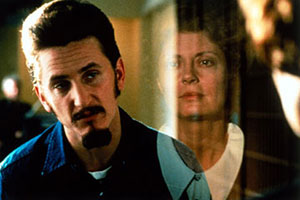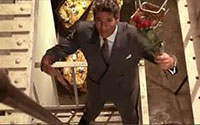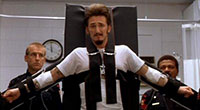
Most screenplays bear some sort of character arc but the “transformation” at the climax often fails to move us. Why? Here I explore what sort of change does tend to profoundly affect your audience.
Is Police Chief Brody transformed in Jaws?
At the start of Jaws, we learn that Brody has a fear of water. At the end of Jaws, while balanced precariously above the bay off Amity Harbour, he shoots the shark. As Cathartic endings go, it works a treat. No question we feel a spectacular release when that predator is instantaneously turned into 5kg of second-rate sashimi. But, are we moved to tears? I’m not.
Yet, Brody, by performing this valorous act on water, has done what I said heroes typically do at the climax in a Transcendent Story – he’s done in Act 3 what he couldn’t in Act 1. Why does Brody overcoming his fear of water not affect us? Why is this not a dramatically effective transformation?
There are a couple of reasons.

The ending of Jaws produces a great release – but how important is it that Brody has overcome his fear of water?
Firstly, and most fundamentally, fear of water is not a character flaw. It’s a psychological condition. Like claustrophrobia. Or agoraphobia. It might make life difficult but it’s not a failing of character. Brody’s fear of water doesn’t diminish his standing as a human. And when we talk about character flaw, that’s what we really mean. How is the character failing to live up to their Higher Selves?
Secondly – and these two things are related – seeing him overcome that fear does not move us. Yes, we feel a release at him overcoming the monster, but that catharsis in no way depends on us thinking – Lordy, look, that man has overcome his fear of water! Oh, the humanity!
Would this ending be any less effective if we were unaware of his fear of water? I don’t believe it would. So the transformation doesn’t come into play.
And we don’t include a character transformation in our screenplays because we think it’s a neat thing to do or because it’s written into our contracts: “Writer must supply one (1) character transformation and payment will be withheld until such time as … ”
We do it solely because we want to produce an emotional response in the audience. That’s what we do. Or try to at least. So if the transformation you have in your screenplay doesn’t move us, there is no point arguing, “But, he used to be like this and now he’s clearly different”. Get out of your heads. Films take place in the heart. If it’s not touching us there, something’s not right.
How important is Edward’s fear of heights in Pretty Woman?

Edward overcomes his fear of heights in the climax of Pretty Woman, but does this constitute a transformation?
Similarly, Edward in Pretty Woman has a fear of heights. So when he has to go to “rescue” Julia Roberts’s character from her life as a working girl, does it work our emotions when he has to overcome that fear to scale the fire escape? Not a jot. Why? Because, again, fear of heights isn’t a character flaw.
Is Indiana Jones transformed in Raiders?
I’m going to do it … I’m going to make another reference to Raiders.
After my last post, a former student of mine, Jeremy (of whom I’m very fond), said, in response to my contention that there was no dramatised transformation in Raiders:
I would actually argue that there is a character transformation in RAIDERS. Not a profoundly moving one, but it’s there (to my mind). Indy goes from a skeptic to a man of faith, when at the climax he closes his eyes and turns away from the Ark because he believes in the supernatural power that is going to be unleashed.
To Jeremy’s credit, he recognises that it’s not a “profoundly moving” transformation. But, if it’s not profoundly moving, then the transformation hasn’t done what it’s there to do. However, it’s instructive for us to explore why this doesn’t work our emotions.
I would say that we have the same problems here in Raiders that we have with the Jaws “transformation”. (And, yes, we are talking about two of the most successful films of all time – films for which I have extraordinary affection and admiration – but neither, by my definition, qualifies as a Transcendent Story.)
Firstly, lack of faith is not a character flaw.
I can hear the screams of indignation rise up around the world.
Yes, I’m sure that if you’re a devoutly religious person you are going to disagree. But, then you are entering murky waters.
Is the lack of a Christian faith a character flaw? An awful lot of Christians, would see it that way. But clearly Muslims and Jews wouldn’t think so. Neither would Buddhists, Sikhs or Hindus. And, I’m an atheist. So you are never going to get me to agree that a lack of faith – of whatever brand – represents any kind of character failing. Honouring your Higher Self, for me, means having a code of moral and ethical conduct – of being a decent human being – and you don’t need to believe in a higher power to do that.
So a lack of faith, I would contend, is a dubious flaw to give a character if you are looking for a universal point of connection. I would suggest that you should give them a flaw to which we can all relate – no matter what we might individually believe about matters unknowable.
But, even if you give a character the “flaw” that they lack faith, you then face the problem of whether you can dramatise them overcoming that flaw – whether in showing them achieve this transformation, that action is going to trigger an emotional response. I’m sorry, but Indy “closing his eyes” isn’t an action that was ever likely to release in the audience a collective flood of tears.
Is Matthew’s conversion about faith in Dead Man Walking?
Perhaps you find it strange that I would say that overcoming a lack of faith is unlikely to move our emotions when the image that sits at the top of this post is from Dead Man Walking. Some of you, I imagine, would see Matthew Poncelet’s pre-death-walk confession as a conversion to God. You are free to perceive it in that way. But many of us would not relate to the act of converting to a belief in a Christian God and if you only looked at the act in that light you could interpret it as self-serving: he’s about to meet his maker, so he’s clearing the slate.
But, I see the more universal interpretation of a man confessing to an act of which he is a grievously ashamed. You don’t have to be Christian to relate to that. I’ve had to fess up to things I’ve done that I’ve deeply regretted. It was hard. And extremely painful – for all concerned. But it had to be done – or my soul would have given me no peace. Most people who watch Dead Man Walking are profoundly moved and it’s not because they have a faith, or believe that everyone should share that conviction. They’re moved because they, like me, have been in a similar place where they have done wrong, and have had to make amends. This is a powerful climax and gives us a clue to what sort of transformation does tend to profoundly affect the audience.
What sort of transformation does profoundly move us?
It all comes down to the choice of the character flaw. You want a flaw to which we can all relate. And, a flaw which we can dramatise them overcoming in a way that will trigger a powerful emotional response.
And, if you look at the films that profoundly move us, there is a surprisingly small range of flaws.
In the films renowned for their moving endings, the hero will typically be shown to overcome one of two things:
Lack of courage. Or Lack of compassion.
Doubt me, by all means. But check it out …
- In Dead Poets, Todd overcomes his lack of courage.
- In Schindler’s List, Oskar overcomes his lack of compassion.
- In The Apartment, Bud overcomes his lack of courage.
- In One Flew Over the Cuckoo’s Nest, R.P. McMurphy overcomes his lack of compassion.
- In Thelma and Louise, T overcomes her lack of courage.
- In Gran Torino, Walt overcomes his lack of compassion.
I could go on. Strictly Ballroom. The Lives of Others. Lars and The Real Girl. Kramer vs Kramer.
Forget about fear of heights or lack of faith. If you can dramatise your hero overcoming a lack of courage of a lack of compassion, there is a good chance their actions will profoundly move us.
Why are we moved by displays of courage and compassion?
Why does the transformation of these flaws move us so? Because they are flaws from which we all have suffered.
We’ve all lacked courage or compassion at various points in our lives – we possibly are lacking it at this very minute – and for sure and certain we will be found wanting of them again at some point in the future.
We know how hard it is to display courage or compassion, particularly when it runs contrary to our own interests, so we’re moved when we see that the protagonist is able to go where we generally fear to tread.
And, this is why people who say they don’t believe in character arcs “because people don’t change” are missing the point. We’re not talking about changing from being an introvert to an extrovert, or from being a philatelist to an extreme surfer. We’re talking about the moments that come along that define who we are at a character level. No-one is always courageous. Not morally. And most of us have lapses in compassion. The great stories remind of us our moral compass, regardless of whether we believe those morals to be God-given or bleedingly bloody obvious. But they don’t remind us by just telling us. They remind us by dramatising it. Here is someone not honouring their Higher Self. Here they are confronted with a choice that will define whether they are going to change or continue in their base ways. Here they make that choice that tells us that, in this moment at least, they are going to honour that Higher calling. And we are moved because of the shared experience of humanity.
But, even if you’ve given your hero a genuine and relatable flaw, there is another trick to getting this transformation to profoundly move the audience, which leads me to my next post …
Great Endings Step 6: Timing is everything with Transformation … which I’ll publish tomorrow.
Previous posts in the Great Endings series:
10 Steps to a Great Movie Ending
Great Endings Step 1: Hero Shouldn’t Get What They Wanted
Great Endings Step 2: Hero should get something more valuable
Great Endings Step 3: Hero should face difficult choice at climax
Great Endings Step 4: Hero can do in Act 3 what he couldn’t in Act 1
Join the Cracking Yarns mailing list
Learn about our Screenwriting Courses
Learn about our Online Screenwriting Courses
Learn about our Free Screenwriting Webinars
Learn about our Script Assessment options
Subscribe to the Cracking Yarns YouTube channel
